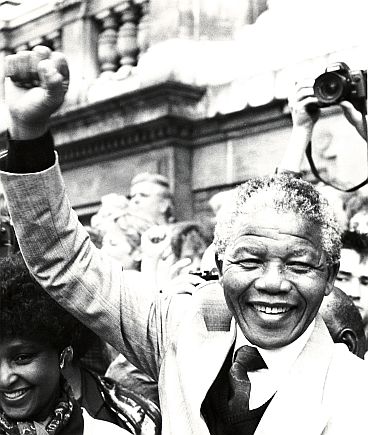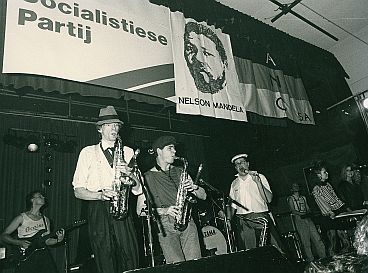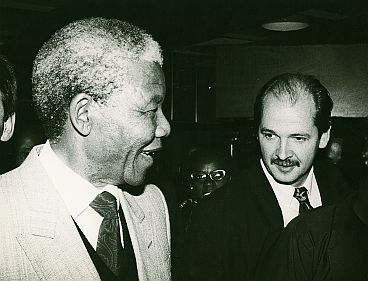Nelson Mandela died on Thursday evening at the age of 95
Nelson Mandela died on Thursday evening at the age of 95
On 11th February 1990 millions of people across the globe were glued to their televisions when the world’s most famous prisoner left his cell and stepped into our living rooms. His liberation meant the beginning of South Africa’s liberation from the unbearable yoke of apartheid, a Dutch word – Dutch being the root of Afrikaans - for a scandalous system of ruthless oppression on the basis of skin colour.
 Nelson Mandela visiting the Netherlands shortly after he was freed
Nelson Mandela visiting the Netherlands shortly after he was freed
On that day we could for the first time see the hidden face of Nelson Mandela, then 72 years old, after twenty-seven years of hopeless incarceration by the barbaric South African apartheid regime. Almost three decades living in a cell 2 metres square left its mark. Mandela’s body was stiff, his hair grey. Yet his face cast a spell. Laughing in a friendly fashion, Nelson Mandela showed the world that good had triumphed over evil. This man had been imprisoned for so long but had never broken. He had brought his oppressors down.
Mandela’s liberation was also a result of worldwide solidarity. Everywhere people had fought to have him and his country freed. “Free Nelson Mandela” they sang, shouted, demanded, from the very first day that he disappeared into prison, often in the face of oppression of their own. For a long time, for far too long a time, the scandalous apartheid regime could reckon on the tacit or even open support of rich western countries, which put doing business before human rights. In the 1980s British Prime Minister Margaret Thatcher was still calling the ANC a terrorist organisation, and he wasn’t taken off the United States’ list of ‘terrorism suspects’ until 2008. In the Netherlands too many refused for a long time to get convincingly behind the demand for Mandela’s release and for an end to apartheid.
Yet the Netherlands also saw enormous and sustained resistance against the horrors of apartheid. The South Africa Committee, the Anti-Apartheid Movement, Kairos, the Boycott Outspan action. Left political parties, including our own, which had struggled since their foundation for Mandela’s freedom and for a free and democratic South Africa. In the 1970s, with thousands of protest cards sent to white South Africans. And in the 1980s with impressive collective actions for the Africa National Congress, and rousing Mandela benefit concerts.
 One of the many Mandela Festivals organised by the SP
One of the many Mandela Festivals organised by the SP
That’s why in 1993 the SP was invited to the ANC’s first international solidarity conference on South African soil. Tiny Kox – national secretary at the time and now Senate leader – and myself as then leader of the party, were the SP’s representatives, sitting in the midst of people from across the world who had shown their solidarity with Mandela and with South Africa. Nelson Mandela originally, under pressure from his doctors, sent his apologies, with the newspapers carrying disturbing stories about his health. A day later he appeared after all, fragile but laughing, clad in a brightly-coloured teeshirt, to calm our fears. ‘Doctors always exaggerate,’ he said, ‘I was just a little tired’. In a conference room which rang to the sound of the national anthem of the new South Africa, “Nkosi sikelele”, he laughed and declared that no-one should worry if announcements about his health appeared. ‘In prison I read regularly in the paper that I was dead. Friendlier journalists wrote that I was only dying.’
 Nelson Mandela with Jan Marijnissen
Nelson Mandela with Jan Marijnissen
Alive and well, Mandela achieved global superstar status, was awarded the Nobel Prize, elected President of South Africa, and led an ANC which commanded the support of the majority of the population. After leaving the presidency in 1999, Mandela remained an example and a source of inspiration for many people, with streets, squares, buildings, prizes – and children! – throughout the world named after him. A living legend, people said then.
And now the media throughout the world are reporting that his life of 95 years has come to an end. The whole world knows it, the whole world mourns, and South Africa’s people most of all. Nelson Mandela has become so important to us all. A modern saint, a fine source of inspiration, the example that shows that good can be victorious. And the monumental human proof that international solidarity can be a colossal force, even in our times. Forward, and never forget!
Jan Marijnissen
